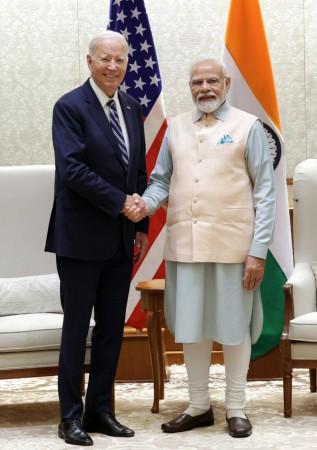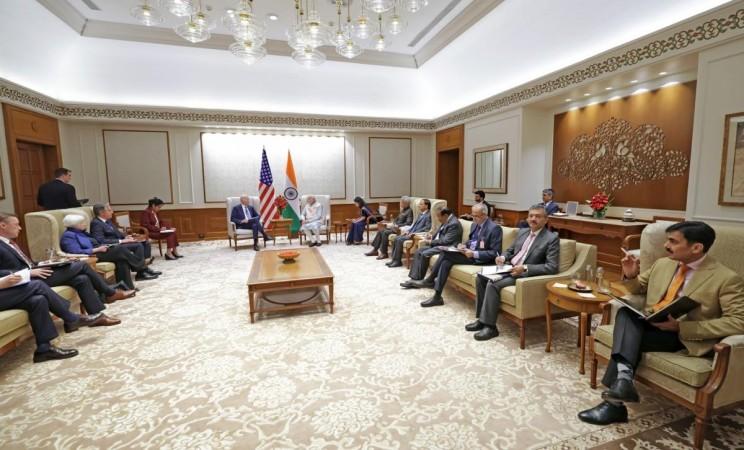In a crucial meeting meeting between Indian Prime Minister Narendra Modi and US President Joe Biden, the two nations unveiled a vision of secure telecommunications, resilient supply chains, and global digital inclusion ahead of the G-20 summit in Delhi to be held on Saturday and Sunday.
The highlight of the bilateral discussions was the signing of a groundbreaking pact between the Bharat 6G Alliance and Next G Alliance, operated by the Alliance for Telecommunications Industry Solutions. This milestone marks the initiation of a robust public-private partnership between technology vendors and operators.
Emphasizing their commitment to enhancing global semiconductor supply chains, Modi and Biden commended Microchip Technology, Inc., for its $300 million investment in expanding research and development activities in India. They also celebrated Advanced Micro Device's announcement of a $400 million investment over the next five years for research, development, and engineering operations in the country.

Furthermore, the leaders welcomed the progress made in the co-production and technology transfer proposal between GE Aerospace and Hindustan Aeronautical Ltd (HAL) for the production of GE F-414 jet engines in India. This collaboration is poised to strengthen India's aerospace capabilities.
In the realm of space exploration, Biden congratulated India on its historic landing of Chandrayaan-3 at the Moon's south polar region and the successful launch of Aditya-L1, India's first solar mission. Both nations are now actively engaged in discussions to mount a joint effort to the International Space Station in 2024, enhancing cooperation in human spaceflight.
The leaders underlined the importance of planetary defense, particularly against asteroids and near-Earth objects. The US pledged support for India's participation in asteroid detection and tracking through the Minor Planet Center.
A significant development in the field of telecommunications involved the establishment of two joint task forces focusing on Open RAN and 5G/6G technologies. A 5G Open RAN pilot in a leading Indian telecom operator was announced, solidifying the commitment to advancing cutting-edge communication technologies.
The India-US Initiative on Critical and Emerging Technology (iCET) continues to be a cornerstone of their partnership. The leaders reiterated their dedication to fostering open, secure, and resilient technology ecosystems and value chains. A midterm review of iCET is scheduled for September, further propelling their technological advancements.
"The United States reiterated its commitment to working together with India in the quantum domain, both bilaterally and through the Quantum Entanglement Exchange, a platform to facilitate international quantum exchange opportunities; and welcomed the participation of India's S.N. Bose National Centre for Basic Sciences, Kolkata, as a member of the Quantum Economic Development Consortium. It was also recognised that the Indian Institute of Technology (IIT) Bombay joined the Chicago Quantum Exchange as an international partner," the joint statement said.
Trade relations also saw positive developments, with the resolution of the seventh and final World Trade Organization (WTO) dispute between the two nations, following the settlement of six bilateral trade disputes in June.
Regarding defense and security, both countries are cooperating on the Rip and Replace Program, and India's support for a Rip and Replace pilot in the US was welcomed.

The leaders emphasized the quantum domain's significance and the establishment of the Quantum Entanglement Exchange. Collaboration opportunities with India's S.N. Bose National Centre for Basic Sciences and the Indian Institute of Technology (IIT) Bombay in the Quantum Economic Development Consortium were highlighted.
In the maritime sector, the US Navy and Mazgaon Dock Shipbuilders, Ltd., signed a second Master Ship Repair Agreement, strengthening India's position as a hub for maintenance and repair of US Navy assets.
President Biden acknowledged India's request to procure 31 General Atomics MQ-9B remotely piloted aircraft, enhancing India's armed forces' intelligence, surveillance, and reconnaissance capabilities.
Both nations underscored the importance of nuclear energy and are intensifying consultations to expand collaboration in nuclear energy, including the development of next-generation small modular reactor technologies.
Lab-to-Lab Collabaoration
The leaders welcomed the India-US Renewable Energy Technologies Action Platform (RE-TAP), focusing on lab-to-lab collaboration, policy development, investment, and skill development in renewable energy technologies.
Efforts to expand electric mobility in India received a boost, with support for the procurement of 10,000 made-in-India electric buses and charging infrastructure.
The gender digital divide was also addressed, with a commitment to halve the digital gender gap by 2030 through initiatives like the Women in the Digital Economy Initiative.
In sum, the India-US partnership continues to thrive across various sectors, from technology and space exploration to trade and defense, reaffirming their commitment to mutual progress and collaboration.

















